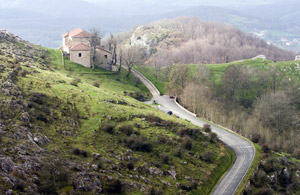Viktor Fyodorovich Markin is a former Soviet athlete, winner of two gold medals at the 1980 Summer Olympics.

Ziortza-Bolibar is a municipality in the province of Biscay, Basque Country (Spain), in the comarca of Lea-Artibai. It has 383 inhabitants according to the 2006 census, and has an area of 18.94 km².

Father José María Arizmendiarrieta Madariaga was a Spanish Catholic priest and founder of the Mondragón Corporation, the largest cooperative in the world, in Gipuzkoa, present-day Basque Autonomous Community.

Berriatua is a town and municipality located in the province of Biscay, in the autonomous community of the Basque Country, in the north of Spain. Its neighbors are Ondarroa and the Bay of Biscay to the north, Markina-Xemein to the south, Mutriku to the east, Amoroto and Mendexa to the west. Historically Berriatua was a town of farmers with little industry. Recently the town has seen significant industrial growth as well as a great deal of construction.

Markina-Xemein is a town and municipality located in the province of Biscay, Bizkaia, in the Basque Autonomous Community, also known as the Basque Country, located in northern Spain. The origin of the town's name lies in its geographic location. The last town in the province of Bizkaia, Markina-Xemein lies between Gipuzkoa and Bizkaia. Coming from the Spanish word "marca" meaning "mark", Markina-Xemein marks the location where the Gipuzkoanos often battled the Bizkainos.

Basque cuisine refers to the cuisine of the Basque Country and includes meats and fish grilled over hot coals, marmitako and lamb stews, cod, Tolosa bean dishes, paprikas from Lekeitio, pintxos, Idiazabal sheep's cheese, txakoli, and Basque cider.
The Careaga family is a Californio family of Central California.
Esperanza y Cia, SA (Ecia) was a defense equipment manufacturer based in the city of Markina-Xemein in province of Vizcaya, Basque Country, Spain. From its origins, Ecia had focused primarily on the design and manufacture of mortars and their ammunition.
Markin is a village in Rudbar-e Mohammad-e Zamani Rural District, Alamut-e Gharbi District, Qazvin County, Qazvin Province, Iran. At the 2006 census, its population was 50, in 20 families.

The Sanctuary of Our Lady of Oro is a place of worship in the Zuia Valley of northern Spain. It is about 3.5 kilometres (2.2 mi) from Murgia, in the center of the valley. Its altitude is 841 metres (2,759 ft) above sea level. From Murgia, the road towards Vitoriano reaches the sanctuary. The first known document mentioning it dates to 1138.
The 2014 Tour of the Basque Country was the 54th edition of the Tour of the Basque Country. It started on 7 April 2014 in Ordizia and ended on 12 April in Markina-Xemein, and consisted of six stages, including a race-concluding individual time trial. It was the ninth race of the 2014 UCI World Tour season.
Alexander Markin may refer to:
Nicolasa Pradera (1870–1959) was a Spanish chef, restaurateur, and is most known for her cookbook "La cocina de Nicolasa", which is one of the staples of Basque cooking.
The 2016 Tour of the Basque Country was a road cycling stage race that took place in the Basque Country between 4 and 9 April 2016. It was the 56th edition of the Tour of the Basque Country and the ninth event of the 2016 UCI World Tour.
Markin is a surname. In Slavic countries it is used only for males, while its feminine counterpart is Markina. It may refer to:

Yolanda Arrieta Malaxetxeberria is a Basque writer. She completed her teaching studies in the school of teachers of Ezkoriatza, in the speciality of Basque Philosophy. After that, she studied theater at the Antzerti school and finally, she studied Cultural and Social Anthropology, at the Faculty of Philosophy and Educational Sciences of San Sebastián. Her greatest activity has always been literature, mainly as a creative writer and also conducting literary workshops and fostering a taste for Literature and Reading.
Aleksandr Markin may refer to:
Salu is a type of twill cloth, woven from cotton and dyed red, originally made in India. Prior to the introduction of modern industrial techniques, it was produced exclusively hand spun (khaddar) yarns with locally-available dyes. Salu is one of seven cotton cloths explicitly mentioned in the 16th century Mughal record Ain-i-Akbari, together with khasa, tansukh, doriya, bafta, dupatta, and panchtoliya.






